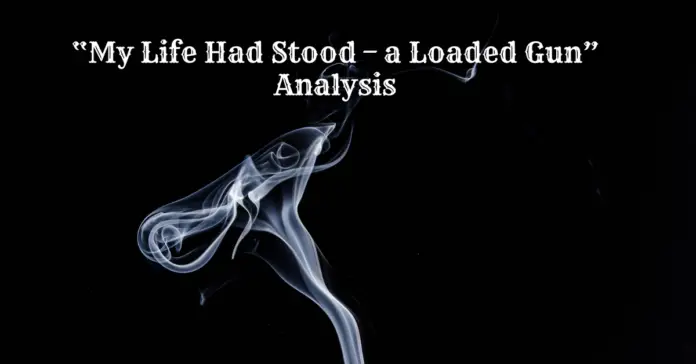Introduction
Written around 1863, “My Life Had Stood- a Loaded Gun”, by Emily Dickenson, is a descriptive poetic piece. It is one of the most powerful poems that talks about the destructive nature of power. The highly symbolic poem presents gun as a speaker, whereas the owner represents her inner rage.
Major Themes in “My Life had stood – a Loaded Gun”
The destructive nature of power, difficulties of life, and death are the major themes of the poem. This allegorical poem presents us with a scene comprising a powerful gun, its owner, and a hunting scene. The rage-filled speaker is bothered by the indeterminacy that exertion of power will fill her with pleasure. The central concerns of the poem are the separation within the speaker of her “Life” from the means to express it autonomously and the consequences for her in the expression of power and pleasure.
At first, she seems devoid of power, was standing silently in a corner. However, her interaction with her autonomous strength leads her to understand the value of her meaningful presence. But no matter how powerful the gun is, it always depends on the actions of its owner for the release of that infinite power. On a deeper note, Dickenson’s poem questions society’s notion that associates concepts like power and strength with male personas. Deviating from this patriarchal concept, she placed herself as the center of power in this poem.
“My Life had stood – a Loaded Gun”- Textual Analysis
The poem is beautifully divided into six four-lined stanzas, known as quatrains. The ABCB rhyming pattern and dominance of other literary and poetic elements have made the subject of the text very clear. With the insertion of these intrinsic elements, one can easily dig out the true meaning of the text. This poem contains elements like personification, symbolism, metaphors, and irony.
A metaphor stands for the direct comparison between two unlike things, without using words like as or like. Dickenson has used an extended metaphor of a loaded gun to show the speaker’s power; a power that needs someone else hands to exhibit its show.
By giving humanistic qualities to a lifeless gun, Emily has brilliantly used another literary technique in the text, known as personification. Similarly, there are a lot of symbols present in the poem that direct the readers to the underlying meanings of the poem. For instance, “Night and day” stand for life and death, “hunt” symbolizes the instinct of mankind and “emphatic thumb” is the representative of the speaker’s extreme anger.
Stanza#1
In this stanza, the speaker compares herself with a loaded gun – unused, standing silently in a corner when one day, luckily, her owner identified his possession and decided to use it for hunting.
Stanza#2
This stanza shows that the speaker is accompanied by her owner. Together, they wander in the woods, hunting a female deer. She brilliantly describes the moment when her owner press the trigger she feels like she is happily fulfilling her owner’s wishes.
Stanza#3
Her vibrant echo was heard through the vast spread mountains. The speaker feels happy as she is performing the task for which she was designed. Therefore, she smiles when her owner uses her for hunting, and her striking smile enlightens the whole valley just like volcanic eruption sparkles with burning lava.
Stanza#4
This stanza shifts the narrative, now, this deadly weapon performs a fulfilling task. At night, it stands by his master, trying to safeguard him from his foes. To her, protecting his master from the odds is far better than sharing a bed with him.
Stanza#5
This stanza, once again highlights the staunch resolution of the gun that intends to face any kind of danger in order to protect his master. Here, she describes her infinite power of knocking down the enemies in the first instance. As soon as they look toward the gun, they will instantly become the victim of her fury
Stanza#6
This highly symbolic stanza highlights the transience of life. The speaker says that the gun may live longer than his master. However, the owner has outlived him because she can only bring death to someone, and does not possess the power to die.
See Also:
“We Grow Accustomed to the Dark” by Emily Dickinson
“Stopping by Woods on a Snowy Evening” Poem Themes










